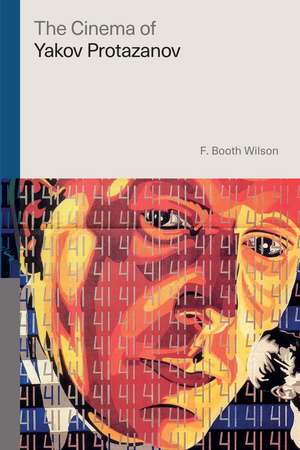The Cinema of Yakov Protazanov: Global Film Directors
Autor F. Booth Wilsonen Limba Engleză Paperback – 12 apr 2024
Preț: 305.28 lei
Nou
Puncte Express: 458
Preț estimativ în valută:
58.42€ • 61.12$ • 48.53£
58.42€ • 61.12$ • 48.53£
Carte disponibilă
Livrare economică 13-27 martie
Preluare comenzi: 021 569.72.76
Specificații
ISBN-13: 9781978839144
ISBN-10: 1978839146
Pagini: 250
Ilustrații: 25 B-W illustrations and 1 table
Dimensiuni: 152 x 229 x 18 mm
Greutate: 0.35 kg
Editura: Rutgers University Press
Colecția Rutgers University Press
Seria Global Film Directors
ISBN-10: 1978839146
Pagini: 250
Ilustrații: 25 B-W illustrations and 1 table
Dimensiuni: 152 x 229 x 18 mm
Greutate: 0.35 kg
Editura: Rutgers University Press
Colecția Rutgers University Press
Seria Global Film Directors
Notă biografică
F. BOOTH WILSON is a lecturer in the Department of Film & Media at the University of California, Berkeley. He has published extensively on film history, theory, and aesthetics in a variety of scholarly journals.
Cuprins
Acknowledgments
List of Abbreviations
Note on Transliteration
Introduction: A Proto- and Protean Filmmaker
1 A Mobile Career
2 The Politics of Literary Adaptation
3 Revolutionary(-era) Traditionalism
4 Abroad at Home
5 Making Comedy Serious
6 The Didactic Voice from Tolstoy to Lenin
Conclusion
Selected Filmography
Notes
Bibliography
Index
List of Abbreviations
Note on Transliteration
Introduction: A Proto- and Protean Filmmaker
1 A Mobile Career
2 The Politics of Literary Adaptation
3 Revolutionary(-era) Traditionalism
4 Abroad at Home
5 Making Comedy Serious
6 The Didactic Voice from Tolstoy to Lenin
Conclusion
Selected Filmography
Notes
Bibliography
Index
Recenzii
"Protazanov is that rare exception of a filmmaker, who made the transition from pre-Revolutionary to Soviet cinema, and who in-between those phases spent several years abroad, in France and Germany; therefore, he does not fit easily within the temporalities of film history. Moreover, his work across various genres, his popularity, and his unflinching professionalism in the face of diverse political regimes has made him fall from the radar of scholarship focused largely on the Soviet avant-garde. Booth Wilson's book fills this gap with an in-depth study of Protazanov's career and a fine analysis of his films, drawing on a wealth of sources for this portrait of Soviet cinema's maybe most popular filmmaker."
“Cinema is an anywhere art. Lubitsch did well in Germany, and even better in Hollywood. Max Ophüls' creative itinerary includes Germany, Hollywood, and France. Protazanov's boomeranged: Imperial Russia, France, and back to Russia, this time Soviet. An indifferent artisan? A promiscuous shapeshifter? Not so fast. As we learn from Wilson's perceptive and penetrating study, the more Protazanov changed, the more he stayed himself—a genuine anywhere artist.”
“Cinema is an anywhere art. Lubitsch did well in Germany, and even better in Hollywood. Max Ophüls' creative itinerary includes Germany, Hollywood, and France. Protazanov's boomeranged: Imperial Russia, France, and back to Russia, this time Soviet. An indifferent artisan? A promiscuous shapeshifter? Not so fast. As we learn from Wilson's perceptive and penetrating study, the more Protazanov changed, the more he stayed himself—a genuine anywhere artist.”
Descriere
Yakov Protazanov was the most prolific Russian director of the silent era whose works enjoyed consistent popularity with audiences as he adapted to the Russian Revolution and, later, the transition to sound. This first career-length study in English argues that he pursued a unique artistic vision that reflected his ambivalent position within Soviet culture of the revolutionary era.


